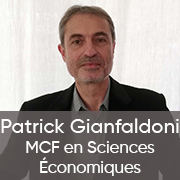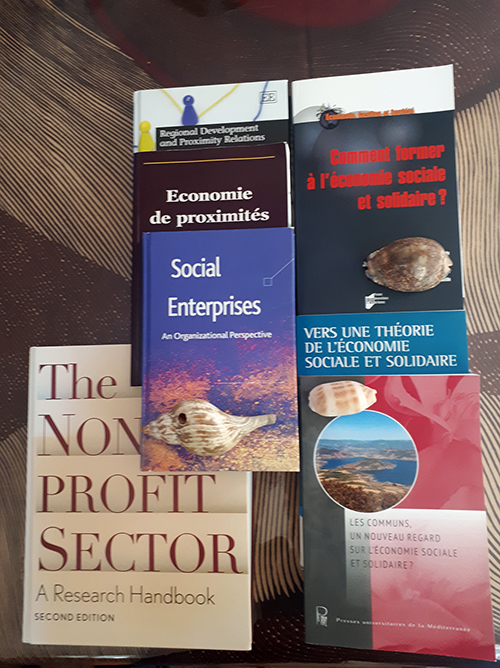[Portrait] Patrick Gianfaldoni, Senior Lecturer in Economics
What is your research about?
In the period 2009-2014, I focused on the analysis of the structuring and properties of the sector of insertion through economic activity - IAE (modes of governance of public action and private strategies, support systems in and through work, attributes of social innovation, social performance, ...). In recent years, my research has focused on social entrepreneurship, incentive contractualisation, economic growth of social enterprises and the phenomenon of concentration, territorial polarisation in the social economy (SSE), the strategies of foundations and the neoliberal social state.

What are your current scientific activities?
I currently have two contracted researches in progress (on "the experimentation project of an alternative tourist accommodation" and on "the territorial identification of structures between SSE and circular economy"). Two are planned for the years 2021-2022 (on socio-economic models in SSE and on the evaluation of social impact in the IAE).
- The contribution of the Fondation de France to territorialized and territorializing processes of social innovation, Innovations - Journal of innovation economicsn°59, vol.2, 2019, 103-127. (co-editor: L. Manoury)
- Understanding to act and acting to understand in the field of social policies. Construction d'un dispositif pédagogique de professionnalisation en Master, J. Stoessel-Ritz and M. Blanc (eds.), How to train in the social and solidarity economy?PURE, 2020, 217-231. (Co-editors: J.R. Alcaras and L. Manoury)
- Faced with a neoliberal welfare state, is the SSE in a position to propose alternative paths? International Journal of Social EconomyNo. 359, 1st quarter 2021. (Co-editor: L. Gardin)
- Competitive impulses in economic integration, Social LifeConcurrence and social and medico-social interventions", n°31-32, January 2021. (Co-editors: Ph. Lerouvillois and O. Dupuis)
- The SSE with regard to sustainable territorial development: Identification of actors, philanthropy and territorial potentialities, RIUESS International Conference: "SSE and Sustainable Development: relevant approaches for the twenty-first century", University of Clermont Auvergne, May 2021. (co-editor: L. Manoury)
- Political versus corporate social economy, in evaluation Review Public Policy and Management. (co-editor: L. Gardin)
Why did you choose to work in academic research?
The choice of university research is the result of two major encounters: the first with the philosophy professor Yves Schwartz and his team in the multidisciplinary analysis of work situations; the second with the economics professor Bernard Guilhon, who enabled me to pursue a doctoral thesis in the field of industrial economics. I am indebted to them for an epistemological approach to research that is both rigorous and transdisciplinary. I have always thought and theorised economics, as an applied science, in relation to sociology, management, history, geography, law and politics.
What advice would you give to students who want to do research?
I can only speak about social science research. First and foremost, research must be fun, not only in the processes of creativity and discovery that it engenders, but also in the handling of the tools and language that it requires. Secondly, students must move away from a mono-disciplinary and rationalist conception of research, unless they want to lock themselves into established methods shared by the intra-disciplinary school to which they belong. On the other hand, the luxury of discomfort that the profession of teacher-researcher allows us should lead them to seek the freedom to know and to learn as they wish.
Which object or image from your research best illustrates you?
The proposed image gathers titles of books that illustrate my current research and the associated university teachings.

The laboratory
The Goods, Norms and Contracts Laboratory is a multidisciplinary research unit that brings together lawyers, political scientists, economists and managers to work on federative research projects.
It is structured around three research themes, each of which mobilises all the disciplines of the laboratory:
- Digital societies
- Labour - Employment
- Voting and democracy
See the other portraits
Mis à jour le 5 February 2024